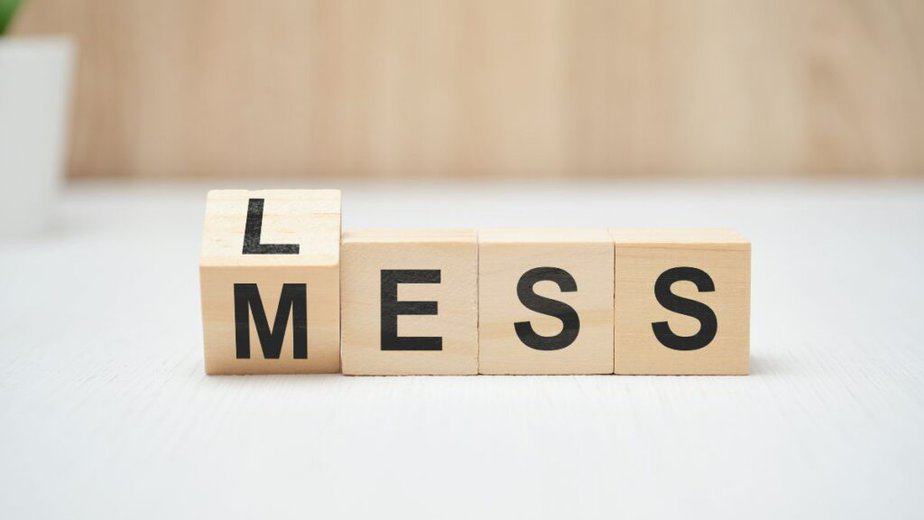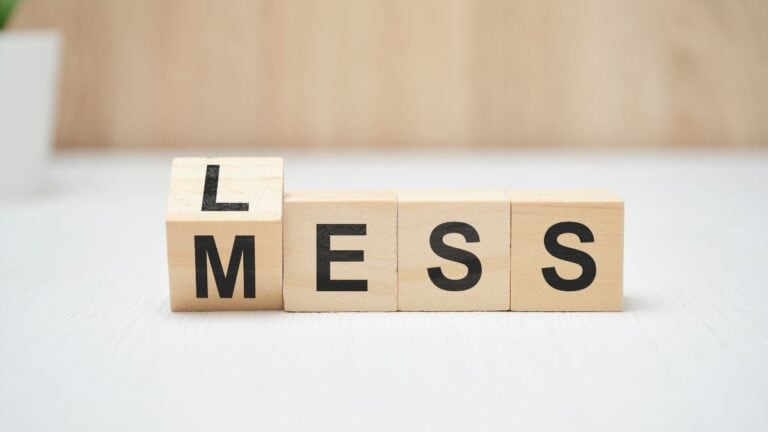If you don’t declutter, clutter will run your day—papers pile up, meetings multiply, and your best ideas don’t stand a chance. In this article, Jef Menguin shares a clear approach to decluttering for productivity that creates space, restores focus, and boosts output. Apply it this week and share it with colleagues so your workplace feels lighter, faster, and easier to sustain.
Decluttering. It’s about more than just tidying up. You declutter to carve out clarity from chaos. In our spaces — where we live, where we work — clutter creeps in. Clutters are those stacks of papers we think we’ll need someday, the items we keep ‘just in case.’
But clutter isn’t just about objects. It’s about attention. When our spaces are cluttered, our minds follow suit.
We must make room — not just in our homes or on our desks, but in our minds. It’s a simple truth: a clear space fosters a clear mind. And with a clear mind comes sharper focus, smoother workflow, and better productivity.
Decluttering isn’t just about cleaning up. It’s about setting the stage for doing our best work, and thinking our clearest thoughts. It’s about simplifying to magnify.
The Problem of Clutter
Clutter, it sneaks up on us. One minute, our space is clean and the next, it’s overrun with things we don’t need. It’s not just about physical stuff. Our days get cluttered too. Meetings that lead nowhere, tasks that don’t add value. Clutter steals our focus, eats into our time, clouds our minds.
When we’re surrounded by clutter, our brains get busy processing all these unnecessary stimuli. It’s trying to find a needle in a haystack, except the needle is our productivity, and the haystack is everything else. We think being busy means being productive. But it’s not the same.
Busy with clutter is just… busy. And being perpetually busy, it’s a trap. We feel like we’re doing a lot, but are we really getting anywhere?
This is the clutter conundrum. It’s not about the stuff or the packed schedule. It’s about how they hold us back. They make us feel overwhelmed, and stressed. Our best ideas, our greatest breakthroughs, don’t stand a chance in a cluttered space, in a cluttered mind.
Many people struggle with clearing spaces.1
But we need a change and simplicity. When we cut through the clutter, we’re not just organizing things or time2; we’re setting our minds free. Free to focus, to create, to achieve.

Benefits of a Decluttered Space
Imagine a space with only what you need. It’s calming, isn’t it?
That’s the first benefit of a decluttered space: peace. When our surroundings are orderly, our minds feel the same. It’s like a breath of fresh air for our brains. Suddenly, there’s room to think, to create, to breathe.
In a decluttered space, everything has its place and purpose. This simplicity does wonders. It cuts down the time we spend searching for things, giving us more time for the work that matters. Efficiency naturally follows. When our environment is streamlined, so are our actions within it.
But the magic of a decluttered space goes beyond just peace and efficiency. It’s about potential. In a clean, clear space, possibilities expand. We’re no longer boxed in by the clutter. Our creativity gets a green light. Ideas flow more freely in spaces that aren’t choked by unnecessary stuff.
And then there’s focus. With fewer distractions, our attention sharpens. We can dive deep into our tasks, giving them the full, undivided attention they deserve. This focused attention is where quality work happens, where real progress is made.
A decluttered space also reflects and reinforces self-discipline. It’s a visible, daily reminder of our commitment to simplicity and focus. It builds a mindset that seeks to eliminate the unnecessary, not just in our physical space but in all aspects of our lives.
In essence, a decluttered space is not just a tidy place. It’s a launching pad for efficiency, creativity, focus, and growth. It’s where our best work begins.
Practical Steps to Declutter
So, you’re ready to declutter. Great! Why? Because these steps are more than just cleaning up; they’re about unlocking your best self. They’re about making space not just in your room or on your desk, but in your mind, for the things that really matter.
Here’s how you can do it:
Start Small, Start Simple
Begin with something manageable, like your desk or a single drawer. Why? Because small wins matter. They build momentum. By clearing out just one area, you’ll feel a surge of accomplishment. And this feeling, it’s addictive. It propels you to tackle bigger spaces. The key? Don’t overwhelm yourself. Remember, decluttering is not a race; it’s a journey.
Evaluate with a Critical Eye
Look at each item. Ask yourself, “Do I need this? When did I last use it?” If it’s not something you use regularly or it doesn’t bring you joy, it’s time to let it go. So what? This step is crucial. It’s not just about getting rid of stuff. It’s about understanding what truly adds value to your life. Now, you’re not just decluttering; you’re curating your space. You’re choosing what deserves your attention.
A Place for Everything
Once you’ve pared down to the essentials, find a logical place for each item. This step is about creating order. Why? Because when everything has a home, maintaining a decluttered space becomes easier. You’ll spend less time tidying up and more time on what you love. The result? A sustainable, clutter-free environment that supports your productivity and peace of mind.
These steps aren’t just about cleaning up. They’re about setting the stage for a more focused, efficient, and enjoyable life. So, roll up your sleeves and dive in. The benefits await.
Decluttering Your Schedule
Now, let’s turn our attention to time, our most precious resource. Decluttering your schedule is about making space for what truly counts. It’s not just about doing less; it’s about doing what’s right.
Here’s how you can declutter your schedule for a more productive and fulfilling life.
Identify Time-Wasters
Start by looking at your typical week. Where does your time actually go? Track everything. Why? Because awareness is the first step to change.
You’ll likely find activities and commitments that don’t align with your goals or bring you joy. These are your time-wasters, and they’re ripe for elimination.
Learn to Say ‘No’
This is tough but crucial. Every ‘yes’ to something unimportant is a ‘no’ to something important. So, get comfortable with turning down requests and opportunities that don’t serve your bigger picture.
This isn’t selfishness; it’s strategic. By saying ‘no,’ you’re respecting your time and goals. It’s about making your yeses more impactful.3
Prioritize with Purpose
Now, refocus on what matters. Align your schedule with your goals and values. Put the important stuff — your big rocks — in first. These are activities that move you towards your goals, that nourish you personally and professionally. Everything else should fit around these, not the other way around.
Decluttering your schedule isn’t just about finding more time; it’s about making your time work for you. It’s about quality, not quantity. By following these steps, you’ll transform your schedule from a source of stress to a tool for success. So, take control of your time. Your future self will thank you.
The Impact on Productivity
With a decluttered space and schedule, the impact on your productivity is profound. It’s like discovering a new gear in your work and personal life.
Here’s what happens when you embrace decluttering:
Enhanced Focus
With less clutter in both your environment and schedule, your mind can hone in on what’s in front of you. Distractions diminish. You find yourself diving deeper into tasks with a laser-like focus. This heightened concentration leads to higher quality work done in less time.
Increased Energy and Creativity
A decluttered space isn’t just visually pleasing; it’s mentally freeing. It’s as if decluttering clears the cobwebs in your mind, allowing fresh, creative thoughts to flow. Similarly, a streamlined schedule leaves you with more energy. You’re no longer drained by tasks that don’t matter. This newfound energy fuels your creativity and enthusiasm.
A Sense of Control and Accomplishment
When you declutter, you take control of your surroundings and time. This control brings a powerful sense of accomplishment. You’re no longer at the mercy of your environment or a packed schedule. Instead, you’re steering your life in the direction you want it to go. This sense of agency is a massive boost to productivity.
Long-Term Benefits
The benefits of decluttering aren’t just immediate; they’re lasting. A decluttered approach becomes a mindset that continually seeks efficiency and clarity. It’s a sustainable practice that keeps paying dividends in all areas of your life.
In essence, decluttering is a productivity superpower. It’s a simple yet transformative practice that elevates how you work, think, and live. So, embrace the power of decluttering. The impact is not just on your space and time, but on your entire approach to life and work.
Sustaining the Practice
Decluttering is a continuous journey. To reap the long-term benefits, it’s crucial to sustain the practice. Here’s how to keep decluttering a part of your life.
Make It a Routine
Integrate decluttering into your regular routine. Set aside time weekly or monthly to review and clear out your space and schedule. Consistency is key. Just like you clean your home regularly, treat decluttering the same way. This habit ensures that clutter doesn’t accumulate and overwhelm you again.
Adopt a Minimalist Mindset
Start seeing decluttering not just as an action, but as a mindset. Embrace minimalism in your daily life. Before acquiring something new, ask if it’s truly necessary. Apply this philosophy to your commitments too. This mindset helps you avoid the trap of accumulating unnecessary stuff and commitments, keeping your life streamlined.
Reflect and Adjust
Regularly assess the effectiveness of your decluttering efforts. What’s working? What’s not? Be willing to adjust your strategies. Maybe a certain approach to organizing isn’t serving you, or you’re finding certain types of commitments creeping back into your schedule. Reflect, learn, and tweak your methods accordingly.
Celebrate the Wins
Acknowledge and celebrate the benefits you’re experiencing from decluttering. Whether it’s a more productive day, a creative breakthrough, or just enjoying a serene space, recognizing these wins reinforces the value of your efforts and motivates you to continue.
Spread the Practice
Share your decluttering journey with others. Sometimes, teaching or encouraging others can reinforce your own practices. Plus, having a decluttering ‘buddy’ or community can offer support, new ideas, and accountability.
Sustaining the practice of decluttering is about building it into the fabric of your life. It’s a commitment to ongoing simplicity and focus. By doing so, you ensure that the clarity, productivity, and peace you’ve gained from decluttering aren’t just temporary but become a permanent part of your life’s rhythm.
Clear Space, Clear Mind
Decluttering is a transformative practice that extends far beyond our physical spaces. It’s about creating room in our lives for what truly matters, for what brings us joy and drives us towards our goals.
By decluttering our spaces and schedules, we don’t just gain a tidier desk or a few extra hours in our week. We gain clarity, focus, and a renewed sense of purpose.
This journey impacts every facet of our lives. It enhances our productivity, sparks our creativity, and brings a sense of calm and control that’s often missing in our busy lives. Make decluttering a continuous practice, a part of our daily mindset, rather than a one-time event.
Choose every day to focus on what’s essential.
Find what works for you. This brings you closer to your ideal self and life. The steps and strategies shared are guides, but your path may twist and turn differently. Embrace that journey. Celebrate your progress. And most importantly, enjoy the clarity and productivity that come from living a decluttered life.
In the end, decluttering isn’t just about having less; it’s about having more of what counts. More time, more focus, more energy for your passions and pursuits.
- Many people struggle to declutter because they feel attached to their belongings, worry they might need items in the future, or find the process overwhelming due to the amount of stuff they have. ↩︎
- You can make the most of your time. ↩︎
- Saying no helps leaders prioritize, focus on key goals, and maintain team health. It shows decisiveness, sets boundaries, and prevents overcommitment, ensuring resources are wisely allocated and the team’s energy is directed toward strategic initiatives. ↩︎
If you’re tired of knowing but not doing…
Let’s make one shift easier to live daily.
→ Shift Experiences


